DNC Rules and Bylaws Committee Meets ... back >
|
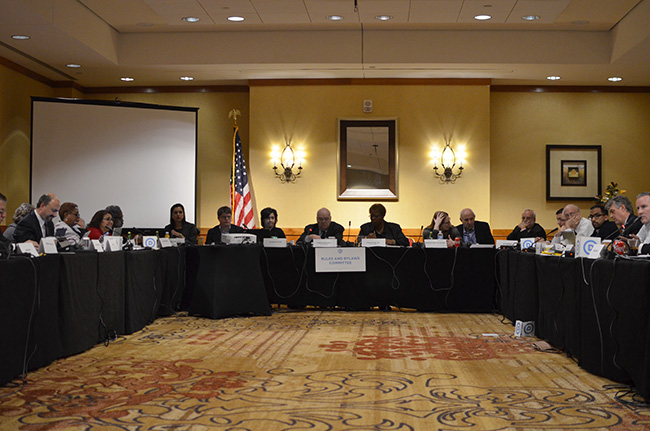 |
Jan. 19, 2018 - The Democratic
National Committee Rules and Bylaws Committee (RBC) met at the Embassy
Suites Convention Center on Friday and Saturday. After approving
three non-controversial amendments to the party's charter and bylaws,
members considered the report and recommendations of the Unity Reform
Commission. In opening remarks DNC Chair Tom Perez described the
Trump presidency as "the most serious stress test on our nation's
democracy," and highlighted recent Democratic successes as evidence
that "Democrats are on the rebound." He said Democrats will have
a 2020 nominating process that is "fair in fact and fair in perception"
and that the DNC will ensure that whoever wins the party's nomination
has the tools to win the general election. The Unity Reform
Commission's chair, Jen O'Malley Dillion, and vice chair, Larry Cohen,
reviewed the Commission's work and report. Cohen said that,
"Unity doesn't fall out of the sky like the rain" and said the report
"represents real change, not fluff."
|
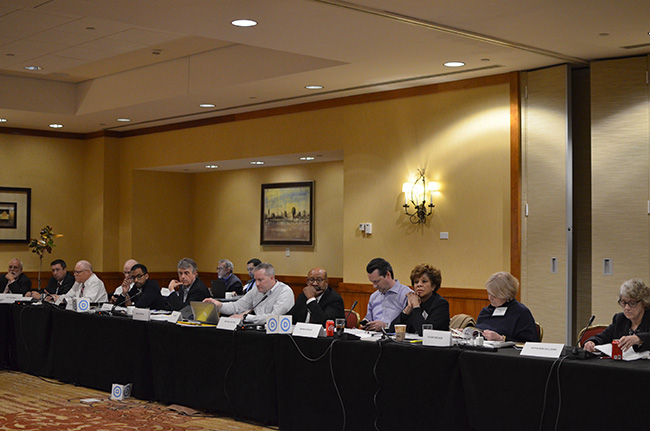 |
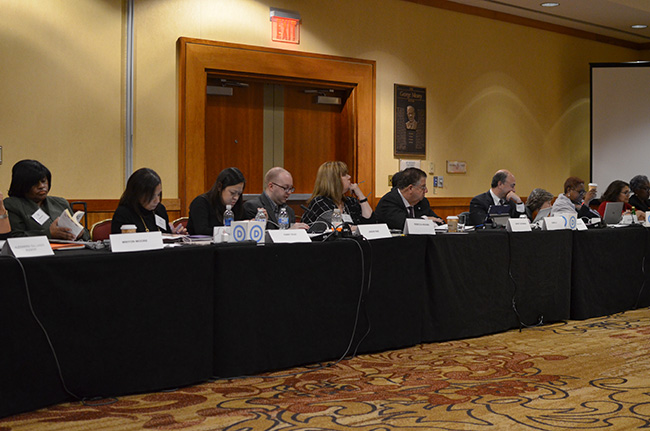 |
The Rules and Bylaws Committee
will consider the recommendations of the Unity Reform Commission over
the coming months, and then they will be put to the full
DNC for approval. One of the major changes recommended by the
Unity Reform
Commission is to
reduce the influence of the automatic unpledged superdelegates.
These are elected officials and DNC members, and in the 2016 nominating
campaign they accounted for about 15 percent of the total delegates to
the Democratic National Convention. Superdelegates can function
as a "safety valve," giving the party establishment a voice in the
selection of the nominee. (If Republicans had such a system,
Trump might not have been their nominee). However grassroots
activists view superdelegates as undemocratic. In 2016 former
Secretary of State Hillary Clinton won the overwhelming majority of the
superdelegates; her ability to lock up the support of many
superdelegates early on gave her a built in advantage and this was a
source of considerable friction with supporters of Sen. Bernie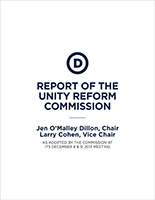 Sanders
(I-VT). The solution put forward by the Unity Reform Commission
would divide the automatic delegates into three categories.
Elected officials would maintain their unpledged status, while state
and at-large DNC members would no longer be unpledged but would be
bound by primary and caucus results on the first ballot at the national
convention. This recommendation could meet with resistance.
One member of
the RBC summed up the proposal as, "effectively we don't have a vote"
on the first ballot. Commission chair O'Malley Dillon put forward
a different interpretation, stating "it's a representative vote."
Commission co-chair Larry Cohen explained, "We're lifting up the votes
of the voters." Sanders
(I-VT). The solution put forward by the Unity Reform Commission
would divide the automatic delegates into three categories.
Elected officials would maintain their unpledged status, while state
and at-large DNC members would no longer be unpledged but would be
bound by primary and caucus results on the first ballot at the national
convention. This recommendation could meet with resistance.
One member of
the RBC summed up the proposal as, "effectively we don't have a vote"
on the first ballot. Commission chair O'Malley Dillon put forward
a different interpretation, stating "it's a representative vote."
Commission co-chair Larry Cohen explained, "We're lifting up the votes
of the voters." |
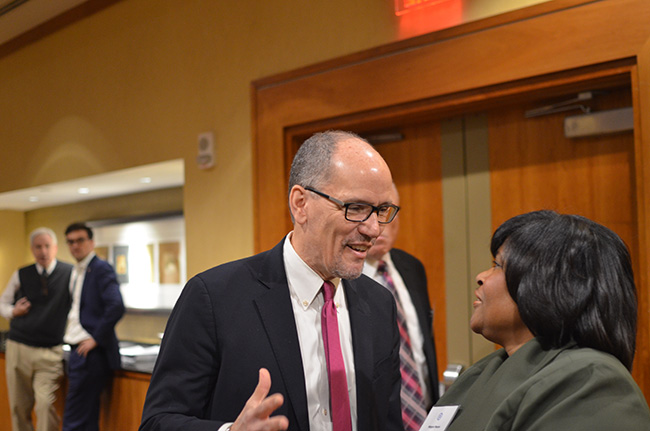 |
DNC Chair Tom Perez speaks with
Minyon Moore, founder of Women Building for the Future and head of
Dewey Square Group's state and local practice, before the meeting.
|
| back
> |



 Sanders
(I-VT). The solution put forward by the Unity Reform Commission
would divide the automatic delegates into three categories.
Elected officials would maintain their unpledged status, while state
and at-large DNC members would no longer be unpledged but would be
bound by primary and caucus results on the first ballot at the national
convention. This recommendation could meet with resistance.
One member of
the RBC summed up the proposal as, "effectively we don't have a vote"
on the first ballot. Commission chair O'Malley Dillon put forward
a different interpretation, stating "it's a representative vote."
Commission co-chair Larry Cohen explained, "We're lifting up the votes
of the voters."
Sanders
(I-VT). The solution put forward by the Unity Reform Commission
would divide the automatic delegates into three categories.
Elected officials would maintain their unpledged status, while state
and at-large DNC members would no longer be unpledged but would be
bound by primary and caucus results on the first ballot at the national
convention. This recommendation could meet with resistance.
One member of
the RBC summed up the proposal as, "effectively we don't have a vote"
on the first ballot. Commission chair O'Malley Dillon put forward
a different interpretation, stating "it's a representative vote."
Commission co-chair Larry Cohen explained, "We're lifting up the votes
of the voters." 

